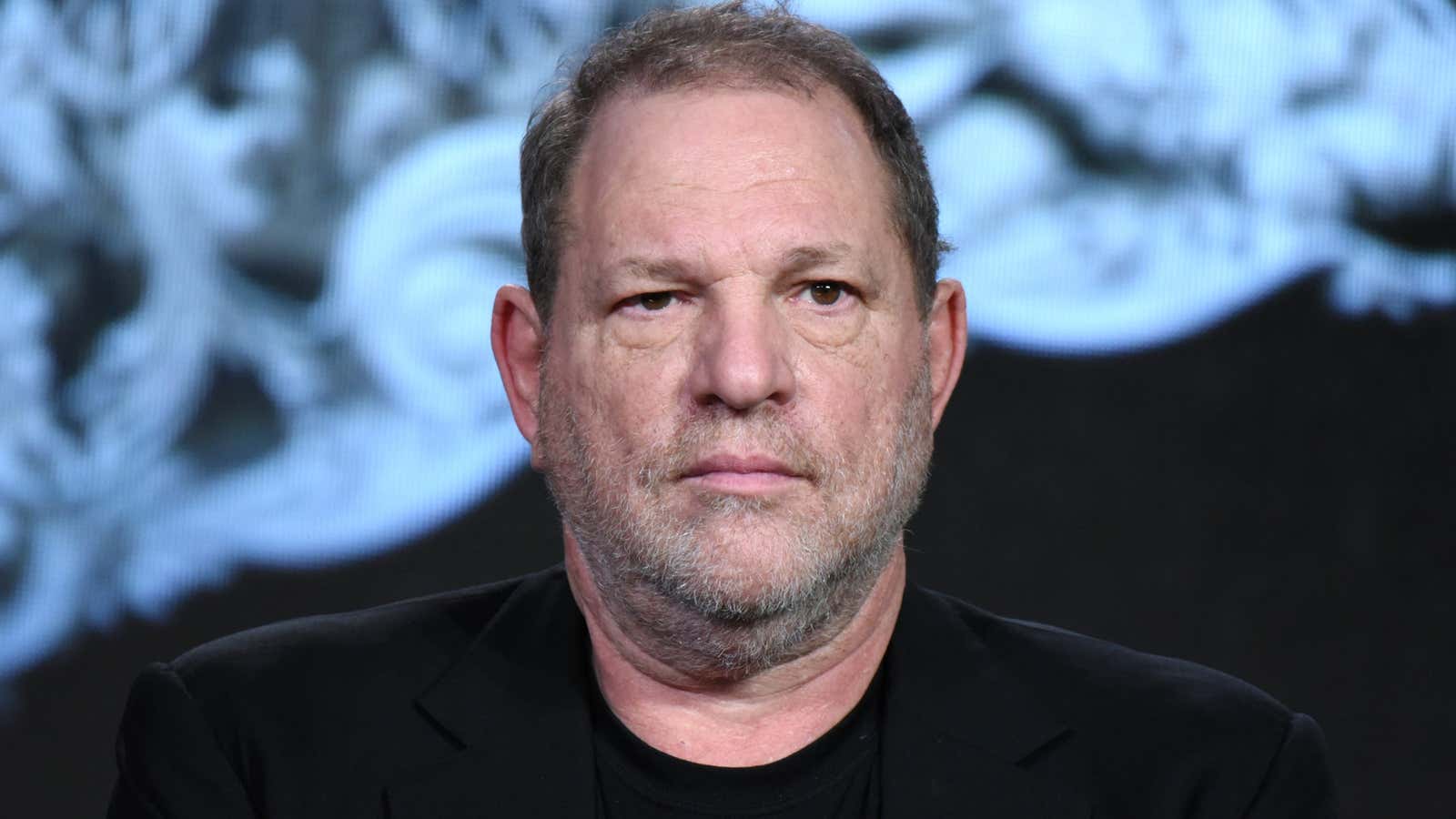The fall of film mogul Harvey Weinstein has been as quick as it has been dramatic: From the New York Times’ explosive report (paywall) on Oct. 5 detailing decades’ worth of accusations of sexual harassment, to his firing on Oct. 9 by the board of the company he co-founded, to further news (paywall) the next day of accusations by multiple women (paywall), some of them superstars.
We might like to believe Weinstein’s downfall is part of a snowball effect, as a more “woke” social climate and the oustings of several other alleged sexual abusers—Bill Cosby, Roger Ailes, Bill O’Reilly—have made victims lose their fear of speaking out. And, indeed, that probably plays a role.
But it doesn’t tell the whole story. We must wonder if Weinstein fell because his enormous influence, and the power structures that helped protect it, had already begun to fade.
Weinstein emerged on the Hollywood scene in the 1970s. He quickly became one of the film industry’s biggest power players, as co-founder (with his brother, Bob) of Miramax, the indie distributor responsible for films like Pulp Fiction and Good Will Hunting. In 2005, he and Bob left Miramax and co-founded the Weinstein Company, whose films have been Oscar fodder for more than a decade.
But since then the company, like many other major Hollywood studios, has fallen into dire financial straits (paywall). And it hasn’t won an Academy Award for best picture since 2011 (The Artist) and, this year, is extremely unlikely to have a single nominee in the field.
In his newsletter The Ankler, veteran film reporter Richard Rushfield argued that the timing of the allegations against Weinstein isn’t a coincidence: “These revelations emerge just at the exact moment that Harvey Grabberhands [sic] is barely in the Oscar race, has no vast pockets of awards budget to blow, no raft of roles to hand out, his legions of foot soldiers a shadow of its once fearsome might.”
It was a similar story for Ailes, the once-mighty Fox News CEO whom several female employees last year accused of sexual harassment. His subsequent ousting was perhaps going to happen soon anyway; the protective bubble around him had begun to deflate when Fox’s owner, Rupert Murdoch, ceded more control of the network to his sons, James and Lachlan, who were decidedly less boosterish of Ailes. (He died in May.)
Bill Cosby, too, was in the twilight of his career when decades-old allegations resurfaced in 2014, leading dozens more women to come forward. One of the most famous comedians in the world in the 1970s and 1980s, Cosby hadn’t done anything of note in years. An old, largely irrelevant man, he was newly vulnerable to allegations.
It’s telling that Weinstein, after hearing of the New York Times report, desperately reached out to top Hollywood acquaintances, pleading with them (paywall) to publicly support him. None did. A decade ago, when the Weinstein Company had more money and was winning more awards, perhaps someone would have come to Weinstein’s aid. But in 2017, he apparently is no longer worth protecting.
Weinstein won’t be the last kingpin to fall. Plenty of executives and stars in the entertainment industry have been publicly accused—in some cases multiple times—of sexual harassment, sexual assault, or rape, but are still in positions of power. One of them, indeed, is the president of the United States.
Because of the risk of libel lawsuits, you may not see many of their names in the media right now, but the previous allegations against them aren’t hard to find: just try this Google search. For some of them, at least, the accusations may not be true. But it would be unsurprising if what happened to Cosby, Ailes, and Weinstein befalls some of these other figures as their power dwindles.
It shouldn’t be this way. But Hollywood has been run mostly by the same group of middle-aged white men for at least two decades, who have stayed relevant by swapping jobs or forming new companies of their own. Sexism is pervasive and deeply entrenched in the industry, and we may have to wait for these men to lose their considerable influence before they are confronted. Weinstein had been the subject of heinous accusations for more than a decade, and had reached settlements with eight different women. His colleagues did nothing to remove him.
